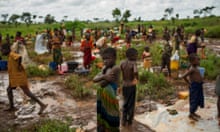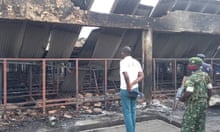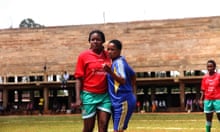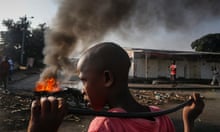Political violence, malnutrition and the looming threats of malaria and cholera have pushed Burundi to the brink of a “major crisis”, the UN children’s agency, Unicef, has warned.
Burundi – one of the world’s poorest and hungriest countries – has been in turmoil since last April, when President Pierre Nkurunziza announced his ultimately successful bid for a third term in office, prompting protests and a failed military coup.
Hundreds of people have been killed and almost 245,000 Burundians have fled to neighbouring countries over the past 10 months.
Bo Viktor Nylund, Unicef’s representative in Burundi, said the violence had exacerbated the country’s already dire food situation, damaged its institutions and led to the withdrawal of some of the donor funding on which it is heavily reliant.
“Before the crisis, the global hunger index had already rated Burundi as the hungriest country in the world,” he said. “What we [have seen] in the health arena – which is 58% reliant on external donors – is that there are cracks in the system, beginning with essential drugs.”
Nylund said Unicef had been forced to step in towards the end of last year to provide basic drugs for pregnant women and children. The education system, he added, was also under serious strain.
“We’re seeing similar developments both in terms of increased reports of kids not having had anything to eat when they come to school so not performing – and so teachers not wanting them in school because they’re not able to concentrate – and also in terms of school materials and availability of resources for the government to actually run teacher training and so forth,” he said.
Nylund added that the surge in violence last December – which claimed the lives of at least 130 people over two days – had been accompanied by an increase in cases of sexual and gender-based violence in the capital, Bujumbura.
In those neighbourhoods most affected by the fighting, said Nylund, Unicef had also reported a doubling of the number of children being brought to clinics suffering from severe acute malnutrition.
“They’re not huge numbers but … in those affected neighbourhoods, people are often not able to leave and come back and go about their daily business,” he said.
Nylund said that although some of Burundi’s big bilateral donors were starting to look at new ways to channel their aid money, the country was still facing a shortfall of about $400m (£280m) this year. Without that funding in place, he said, Burundi would struggle to deal with the increase in malaria cases caused by El Niño and the cholera outbreak threatening to spill over the border from Tanzania.
“I don’t have a crystal ball, but we’re definitely seeing scary things on the health horizon,” he said.
“Even without any more violence, there will be a major crisis, so the time to invest is now – not when it’s too late … There’s no way that the people of Burundi can survive with all of this support being pulled out.”
The UN high commissioner for human rights warned last month that “a complete breakdown of law and order” was “just around the corner” in Burundi, where his office is examining allegations of gang-rapes, enforced disappearances and the digging of mass graves linked to December’s violence.
On Tuesday, the government banned motorcycles from the streets of central Bujumbura following a series of attacks in which grenades were thrown by people on motorbikes. There were five such attacks across the city on Monday, leaving one child dead and scores injured.
Médecins Sans Frontières said it treated more than 60 people on Monday. Two similar attacks five days earlier wounded dozens of people.










